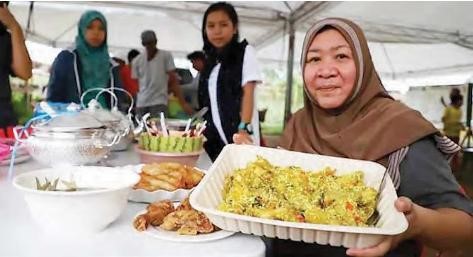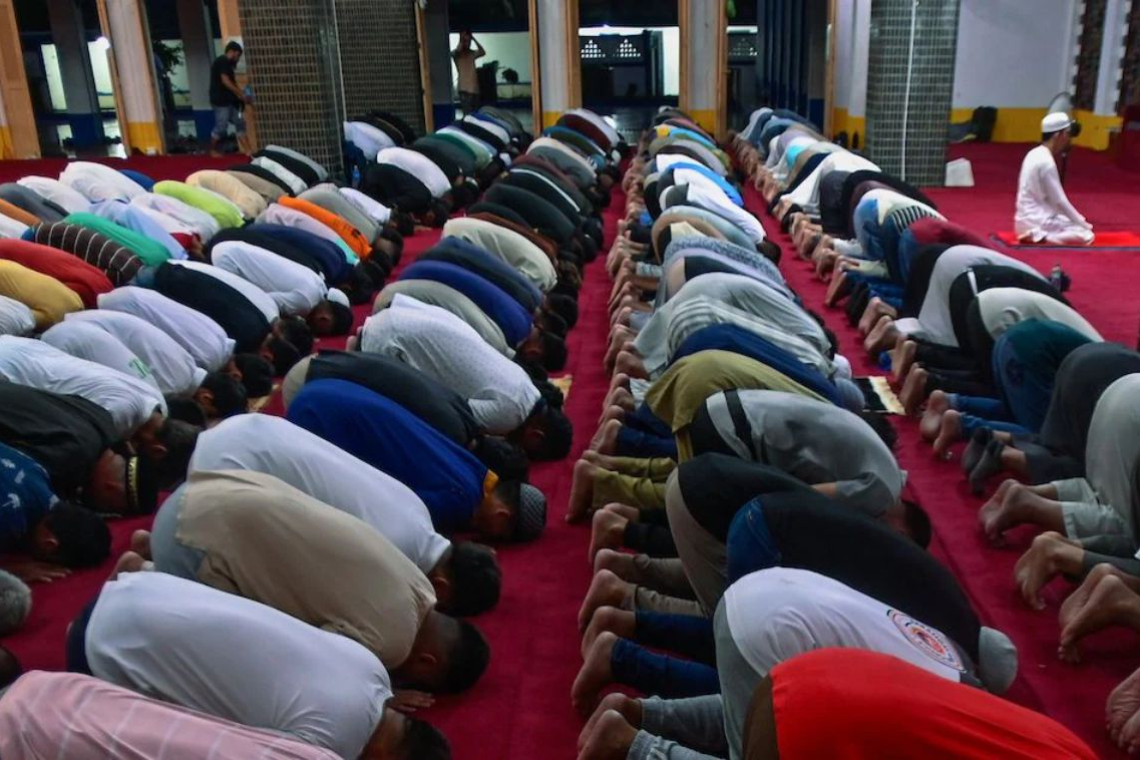Filipino Muslims in prayer during Ramadan (2024), Taguig City, The Philippines. Image Source: Maria Tan, ABS-CBN News/file
The Philippines, an archipelago of over 7,600 islands, is a rich tapestry of cultures and traditions
Filipino Muslims, accounting for approximately 10% of the country’s population, primarily live in the Southern regions of Minanao, Palawan, and Sulu, with most believers residing in the Bangsamoro Autonomous Region in Muslim Mindanao (BARMM). This region enjoys a unique amalgamation of Islamic and Philippine heritage, particularly palpable during the Holy Month of Ramadan.
As of March 2, 2025, the Muslim community in the Philippines has been observing Ramadan. During this sacred month, Muslims engage in “sawm,” or fasting, from dawn (roughly 5:00am) until sunset (approximately 6:00pm). The pre-dawn meal, "suhoor," and the sunset meal, "iftar," are integral components of their daily routine during this special time.
Ramadan in the Philippines is marked by a variety of cultural practices that vary across different regions. Local gatherings often provide free meals to those observing the fast, fostering a deep sense of community. Mosques become centers of heightened religious activity, with many congregants participating in nightly prayers known as "Tarawih." Additionally, unique traditions such as early morning prayers, or "Simbang Gabi," lead up to the celebration of Eid al-Fitr. Acts of charity, or "zakat," are emphasized during this time, ensuring support for those in need, according to the five pillars of Islam.
A cherished culinary tradition during Ramadan is the preparation of "sindol," a delicacy favored by the Moro communities, particularly the Maguindanaons. This dish combines locally sourced ingredients such as sweet potatoes, taro, coconut, banana, corn, tapioca, and jackfruit. The process involves boiling coconut milk with these ingredients and adding glutinous rice, resulting in a nourishing meal that holds both cultural and familial significance.

A communal Iftar celebration, The Philippines. Image Source: Oman Daily Observer.
Ramadan in Bansamoro
The Bangsamoro region holds particularly vibrant Ramadan observances, featuring large-scale community iftars, Quran recitations, and charitable outreach programs. The Office of the Wālī of Bangsamoro has organized events such as the "6th Night Ramadhan and Qur'an in the Bangsamoro 2025," which promote Islamic scholarship and community bonding. Furthermore, a Ramadan fair held in the BARMM compound showcases traditional Muslim cuisine and crafts, reinforcing cultural pride and unity.
A notable act of reconciliation in the spirit of Ramadan occurred just in its anticipation (February 2025), when a decade-long clan feud, or "rido," in the BARMM region was peacefully resolved. Facilitated by the Bangsamoro Government's Ministry of Public Order and Safety (MPOS), this mediation brought formerly warring families together for dialogue and a communal meal. The resolution of this conflict reflects the values of peace and forgiveness that Ramadan encourages, highlighting the broader impact of the holy month beyond religious observance.
A Celebration for All
The spirit of interfaith harmony is evident during the Ramadan season with non-Muslim Filipinos often showing support and respect for their Muslim neighbors during this important time. This mutual understanding and accommodation highlight the nation's commitment to cultural diversity and appreciation.
Recognizing the importance of Ramadan, the Philippine government has declared Eid al-Fitr and Eid al-Adha as national holidays. In 2025, Eid al-Fitr is tentatively scheduled for March 31, marking the end of Ramadan. Eid al-Adha, also known as the Feast of Sacrifice, is anticipated to be observed on June 6, 2025. These acknowledgments allow individuals of all faiths to partake in the celebrations, promoting unity and respect for the country's diverse cultural fabric. Local communities often organize events that encourage interfaith dialogue, featuring traditional Muslim cuisine, music, and dance, thereby strengthening communal bonds and “bayanihan” - the Filipino value of camaraderie for a common cause.
Ramadan in the Philippines exemplifies the nation's dedication to embracing and celebrating its vast cultural landscape. The mutual respect and understanding displayed during this period serve as a testament to the enduring power of solidarity and understanding across the broader Philippine archipelago.
REFERENCES
Bacongco, K. (2025, February 24). BARMM preparing for Ramadan, expected to begin March 1. Manila Bulletin. https://mb.com.ph/2025/2/24/barmm-preparing-for-ramadan-expected-to-begin-march-1
Bangsamoro Government. (2025, March 3). Fidyah: Charitable compensation in Islamic practice. https://m.facebook.com/thebangsamorogovt/photos/fidyah-a-form-of-charitable-compensation-in-islamic-practice-allows-those-exempt/945198557730204
Fernandez, E. (2025, February 12). Decade-long rido resolved in BARMM ahead of Ramadan. Philippine News Agency. https://www.pna.gov.ph/articles/1243887
Fernandez, E. (2025, February 28). Muslims in PH mark Ramadan with prayer, fasting, and charity. Philippine News Agency. https://www.pna.gov.ph/articles/1245102
Fernandez, E and Lacorte, G. Inquirer Plus. (2025, March 3). BARMM chief to Muslims: Work for peace during Ramadan and beyond. https://plus.inquirer.net/news/barmm-chief-to-muslims-work-for-peace-during-ramadan-and-beyond
Office of the Wālī of Bangsamoro. (2025, March 3). 6th Night Ramadhan and Qur'an in the Bangsamoro 2025. Facebook. https://shorturl.at/43KEY
Oman Daily Observer. (2025, March 5). Traditions and Community Support during Ramadhan in the Philippines. PressReader.
https://www.pressreader.com/oman/oman-daily-observer/20250305/281986088311582
Tenedero, E. (2025, February 28). Ramadan 2025 in PH starts March 2. ABS-CBN News.
https://www.abs-cbn.com/news/nation/2025/2/28/ramadan-2025-in-ph-starts-march-2-2032



